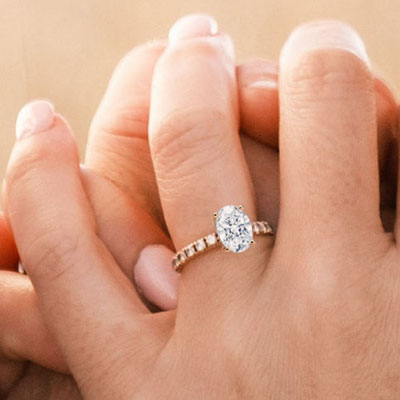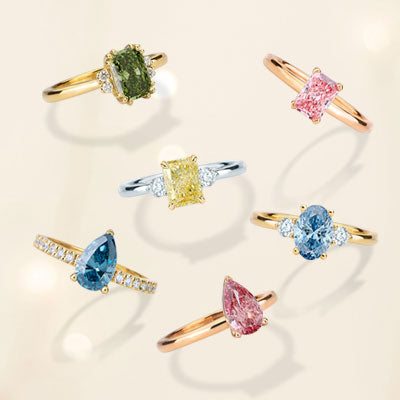There is nothing more beautiful and more radiant than a sparkling jewelry. A gem can become a precious family heirloom if cared for properly. St-Onge Jeweller thought about sharing some tips to take better care of your jewelry.
Wearing jewelry on a daily basis means you will have to take special care of your jewelry. Oil, sweat and salts eliminated by the body are a major factor of wear and stain. Soap easily gets into the hollow parts of your jewelry and remains stuck despite rinsing under water. It is highly recommended to remove your rings before washing your hands. To make them shine as much as possible, we suggest you gently clean your jewelry with a soft brush (a toothbrush for example), a grease remover product or soap and water, about once a week. This will reduce the build-up of soap, dirt, dust and pollution. Once cleaned, simply rinse your jewelry with clear water and dry with a soft cloth. This technique is not recommended for stones such as amber, pearls, coral, emeralds, jade, lapis lazuli, opals and turquoise.
If your jewelry draws meshes in your clothes or if you have a moving stone, this means the prongs (small tabs that hold the stone in place) have moved and are no longer safe. If this is the case, we suggest you avoid wearing your jewelry and come see us. Our expertise in the field of jewelry ensures that we can better advise you and fix the problem.
As often as once a year we encourage you to come see us for a good polishing to restore the lustre and shine of your jewelry. We offer the polishing and repairing services in our offices. At the same time, we can verify if the jewelry is still in perfect condition, replace stones or repair any broken part if this is the case.
Gold and platinum are both dense metals, but their hardness is less than 5. This means that they can be scratched easily. It is therefore recommended not to wear more than one ring on the same finger or several chains at once, because the friction will prematurely use your jewelry. To make your jewelry shine as much as possible, it is suggested to clean it gently with a soft brush and a grease remover at least once a week. Then rinse with clear water and dry with a soft cloth. This will prevent the build-up of soap and dirt.
To clean your silver jewelry, nothing is better than using a soft brush with soap and water. Then rinse with clear water and wipe with a soft cloth. Not wearing your silver jewelry will make them tarnish and turn black. Many products are available on the market to clean your silver jewelry such as antitarnish cloths, cleaning products and silverware foams.
A diamond is the hardest stone with an index of 10 on the hardness scale. It can only be scratched by another diamond. It is important to avoid putting them in contact when wearing or storing them. Wearing more than one ring on the same finger is not recommended. Also be aware that diamonds can scratch other gemstones, metal or pearls. When not wearing them you should store your jewellery separately, preferably in soft tissue pockets. Dirt or abrasives can also affect a diamond’s brilliance. The use of corrosive chemicals can cause degradation and loss of gloss of the diamond. To always have shiny diamonds, gently clean the stones with a soft brush and a degreaser. Rinse with clear water and dry with a soft cloth.
Pearls are organic gemstones and can last over a hundred years if properly maintained. Cultured pearls are soft and require special care. Their surface is porous and can easily be deteriorated. They are particularly sensitive to chemical deterioration, including oils and salts from the skin. However, wearing your pearls regularly will cause your pearls to keep hydrated through the skin and thus retain their beauty and brilliance. Avoid putting your pearls in contact with cosmetics (perfumes, hairspray, alcohol...). If you do wear cosmetics, it is important to wait a moment before putting on your jewelry for the fumes to volatilize. A pearl necklace worn on a daily basis should be restrung once a year or as soon as you see signs of wear. You can clean your pearls by simply wiping them with a soft cloth to prevent from scratching their surface. When not wearing them, your pearls should be stored in a soft tissue or a pocket separate from your other jewelry.
Emerald
This is probably the most delicate precious stone. Crystallization peculiarities and inclusions make this stone very fragile. Therefore, avoid any kind of impact, temperature variation (cool water / hot air for example) and heat sources. Above all, do not expose it to detergents which will alter its colour and finish.
Ruby
A ruby is not a particularly fragile stone. It comes right after diamonds on the hardness scale. It is recommended to avoid contact with diamonds, shocks and friction.
Sapphire
A sapphire is not a particularly fragile stone. As the ruby it also ranks second in the scale of hardness after diamond. Avoid contact with diamonds, shocks and friction.
It is not recommended to use an ultrasound machine at home. Only a professional can determine if their use is safe for your jewelry. If this type of cleaner is suitable for gold jewelry without gemstone like a band, it is imperative not to immerse an amber, coral, emerald, lapis lazuli, opal, pearl, ruby and turquoise.


